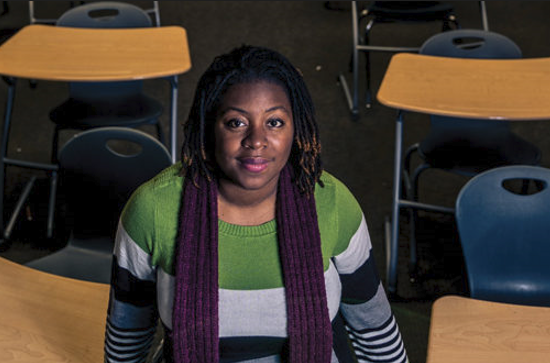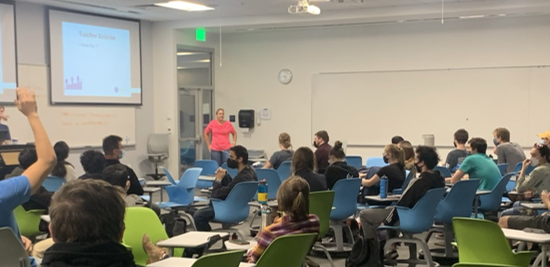A Conversation with Super-Teacher Jonté Lee
A Conversation with Super-Teacher Jonté Lee
By Stephanie Ryan, for inChemistry Magazine
What started as a passion for inspiring students from underrepresented backgrounds turned this teacher into a kitchen-chemistry household name. Learn about his surprising career.
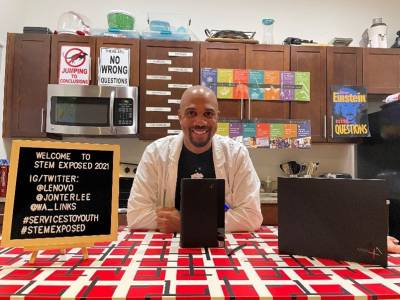
Jonté Lee
You’ve probably already seen or heard about Jonté Lee because he did some amazing things during the pandemic. He is currently a fifth-grade general science teacher for the District of Columbia Public Schools (DCPS) in Washington, DC, as well as a Department of Defense STEM Ambassador. He has appeared in People magazine because he opened up his kitchen to the world to teach them chemistry during the pandemic. I recently had the pleasure of interviewing Mr. Lee to hear more about his path to becoming a teacher and his experiences with teaching.
What inspired you to go into teaching?
I think I was born to teach. While other kids would play with toys, action figures, and Barbie dolls, I would play with textbooks. I would make pretend lessons. The movie The Marva Collins Story, watching her in that role as a teacher just made me want to teach even more. Seeing her in action made me want to become a teacher. My second grade teacher, Miss Richardson, taught with love and compassion. No matter what was going on crazy at home, the moment I stepped into her classroom everything was forgotten. It was like this euphoria oasis. She opened my eyes to becoming a teacher because of the way she taught.
Did you always see yourself teaching chemistry?
I am a bio major and chemistry was not my forte, but I still had a minor in it. High school chemistry was a torturous subject. I didn’t like chemistry; I thought it was a bunch of equations I would never use in the real world. I started teaching chemistry five years ago when I switched high schools. I taught chemistry at Calvin Coolidge High School in the Early College Academy program. When I got to my new school, they said, “Mr. Lee, you are going to be teaching chemistry.” And I sighed and said, “Oh no.” But it was the best move for me because I got to make chemistry more accessible to my students. There were concepts I had to review, but I was able to pick up the material quickly. It wasn’t difficult because I could finally see how chemistry connected to the other sciences. It started to make sense. I got to turn my kitchen into a classroom and bring in more of the cooking aspect for chemistry. Everybody likes to eat and cooking is basically just chemistry. I knew I was effective in my teaching when my students could apply chemical concepts to the real world. I look back and laugh because I love chemistry now. I love chemistry because the principles of chemistry are used in cooking and baking, and I love to cook and bake. I also like the abstract thinking of chemistry. I love the subject of chemistry. Teaching chemistry has changed my view of the discipline because I had the opportunity to make chemistry accessible, engaging, and fun. I was able to teach it differently than the way I learned it.
Your college life and early career took a lot of turns. How did you go from wanting to be a psychologist when 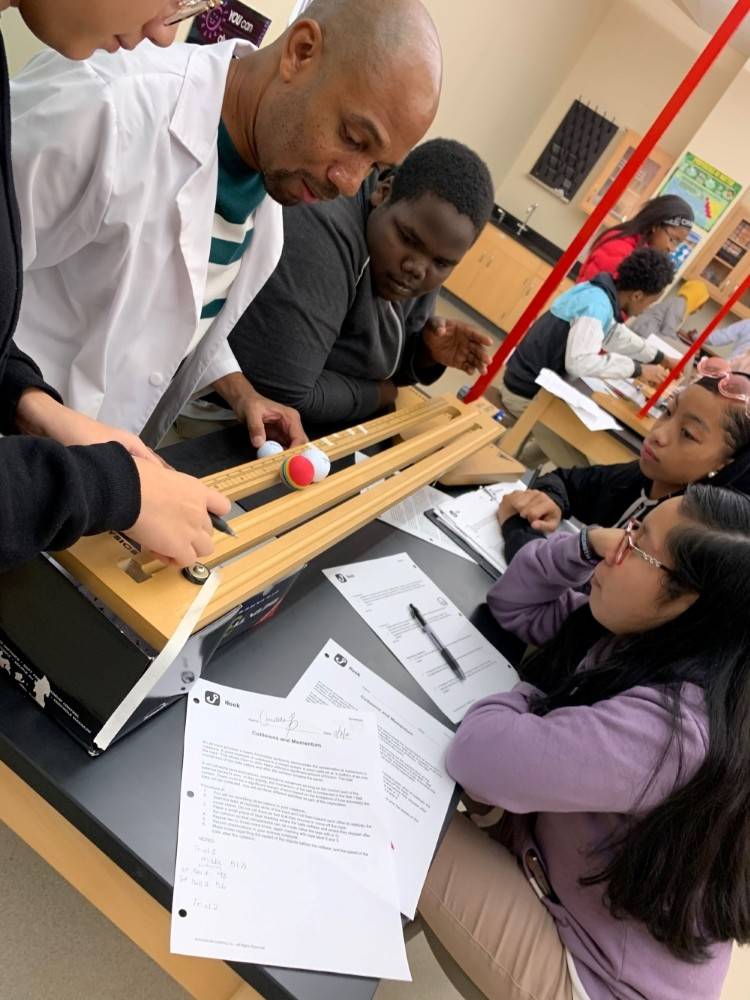 you started college to becoming a chemistry teacher?
you started college to becoming a chemistry teacher?
I took the nontraditional path to a traditional career. I changed my undergrad major four times. First, I was psychology, then pre-med, education just for one semester, and then from there I was a bio major. I went to graduate school and got my master’s in marketing, and teaching was nowhere on my radar. It was one of those things I dreamed about but just forgot about it. Teaching has always been a passion of mine. While my peers played with action figures, I played with textbooks. I always enjoyed taking complex concepts and making them understandable. I enjoy learning the way people learn.
I got my teaching certificate from Howard University, but that was years later. I got that in 2012 and I graduated undergrad in 2003. The certification program required me to think about how other people think. For example, when I am preparing a lesson, I must think about how my students will receive this topic, what misconceptions they will have, and whether their prior knowledge will affect the learning of the new concept. The most impactful aspect of the teaching certification program is one of the after effects—when a student comes back and tells me how much I have inspired them. A teacher always wonders if they properly prepared their students to be ready to take on the world. When a student returns to tell me that I helped to prepare them in a small way, it brings me great joy.
First job: a marketing specialist in corporate America. I hated it. That was just so horrible. I wrote display store guides for over 40,000 employees. I felt that I was not making a difference and was just existing. Every day, I felt like I was dying and losing myself a little bit. I was there for 4 years. It was a depressing period in my life. I would volunteer with the Big Brothers Big Sisters program during my lunch break. At a local elementary school, I read to my “little brother,” which was my bright spot. His reading skills shot up, and I enjoyed that so much. This was the beginning for me. Volunteering with the Big Brothers Big Sisters program was the beginning of me realizing that I had the skills to be a teacher.
I decided corporate America is not for me. I didn’t like it; it just wasn’t my passion, and it just wasn’t a fit. The one thing I learned from it is that if you aren’t doing something that you love, it’s not a fit and it shows. Then I started working for the nonprofit INROADS where I worked with college students and also people in corporate America as an intern manager. I would help college students of color find paid summer internships that would lead to full-time employment upon graduation. So it was a perfect blend. While I was there, I started working at the University of Phoenix online part-time teaching marketing and business statistics, and I loved it. I loved that every class was different. I loved working with the students and seeing them grasp the concepts. I loved that I was making a direct impact on their lives and thus making an impact on the world. This is where I entered the next stage of considering becoming a teacher as a career. I loved my part-time gig more than my full-time gig. That is when I knew I had to make a change. To make it even more obvious that I needed to make a change, I heard an ad on the radio that said, “Hey, do you want to become a teacher?” and I went, “Huh. Let’s just give it a try!” and after that the rest is history.
Did you take advantage of any funding programs to become a teacher?
Yeah, it was the Ready to Teach Grant at Howard University through their Education College. But the thing is, there are SO 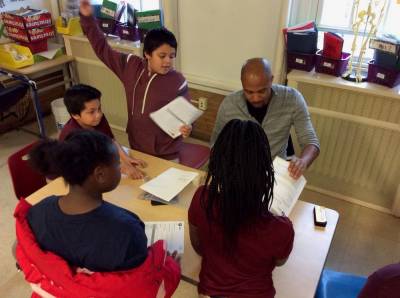 MANY federal funded grants to get people into teaching, teaching as a second career. That grant ran out, but it was amazing because I started taking classes in June 2012, and in August 2012 I was in the classroom. And just like that: a full-time teacher. My salary went from $50,000 to $70,000.
MANY federal funded grants to get people into teaching, teaching as a second career. That grant ran out, but it was amazing because I started taking classes in June 2012, and in August 2012 I was in the classroom. And just like that: a full-time teacher. My salary went from $50,000 to $70,000.
What is your favorite part of being a teacher?
The interactions with the students! They come to you fresh every single day. In their mind everything just resets. And that’s another opportunity to make a connection with them. Forming those long-lasting relationships with them. Students give you a gift and they give you the best that they could: their trust. That’s their most prized possession. And whenever you receive that trust and that they just give it to you, it is the greatest feeling in the world.
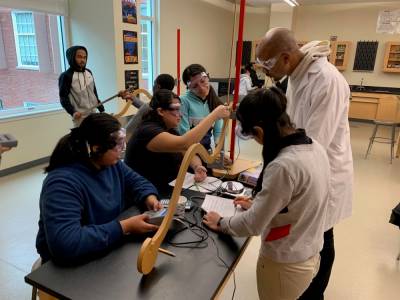
What advice would you give to an undergraduate student who is considering becoming a STEM teacher?
It is rewarding to pour into someone else. It is rewarding that you are making a strong contribution to society. You are ensuring the survival of our species by preparing the next generation. Teaching is one of those professions where just because they went to school doesn’t mean they know how to operate or run a school. Shadow a teacher. See what it’s all about. It’s just not about having the summers off and having extra time off for Christmas vacation and stuff like that, but make sure that it’s something you want to do. Ask yourself the tough question, “Is this something that I really want to do?” Because we are taking people’s lives in our hands. Parents have a trust for us that we are going to do the best by their child. Because their child is their greatest investment, and we help them get a return on that investment. This is nothing to play around with. This is serious. Be serious, shadow, and ask yourself those tough questions.
Did any of the benefits of a career in teaching surprise you? 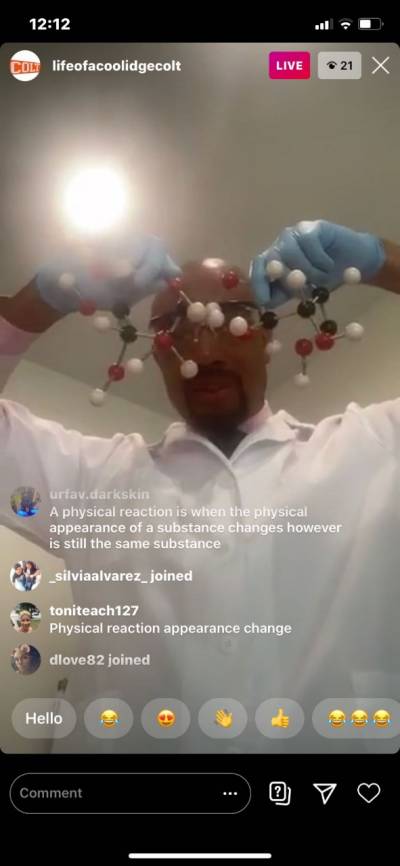
When I tell people I am a teacher, I get all kinds of discounts. That’s a benefit. Another is that you have a lot of social capital with society. It is kind of like serving in the military where people thank you for your service. Thank you for everything that you do for our students. The benefit is an appreciation for the sacrifices that we make.
What can’t you live without in your classroom and why?
My students. I know, I know. It sounds corny, but let me explain. I’ve taught in classrooms where I had zero technology or it didn’t work. As a teacher, you make it work. The show must go on. I’ve had it all and I’ve had nothing, and I made it work. But the one thing I can’t do without is my students.
What is the most important project you have worked on in your career?
It was when I was doing my Facebook lessons during the pandemic. I had other students log in from San Francisco all the way to Boston. Two middle school kids reached out through their parents that the most important thing was having someone in science that looks like them. So me working on that project of doing those Facebook lessons it just wasn’t about me. It made me a community teacher that is not bound by the four walls of the classroom. Representation is important. I am an African American male, and there’s only 2% of us in the entire teaching force in the USA. I also have a speech impediment so that number is even less. Our kids need to see that diverse body and how diversity contributes to society.
This article was originally published on February 21, 2023, by inChemistry Magazine, the American Chemical Society’s publication for undergraduate students in the chemical sciences. The magazine offers insights on career options, professional skills, academic achievement, graduate school, navigating the job market, and preparing for the workplace.


